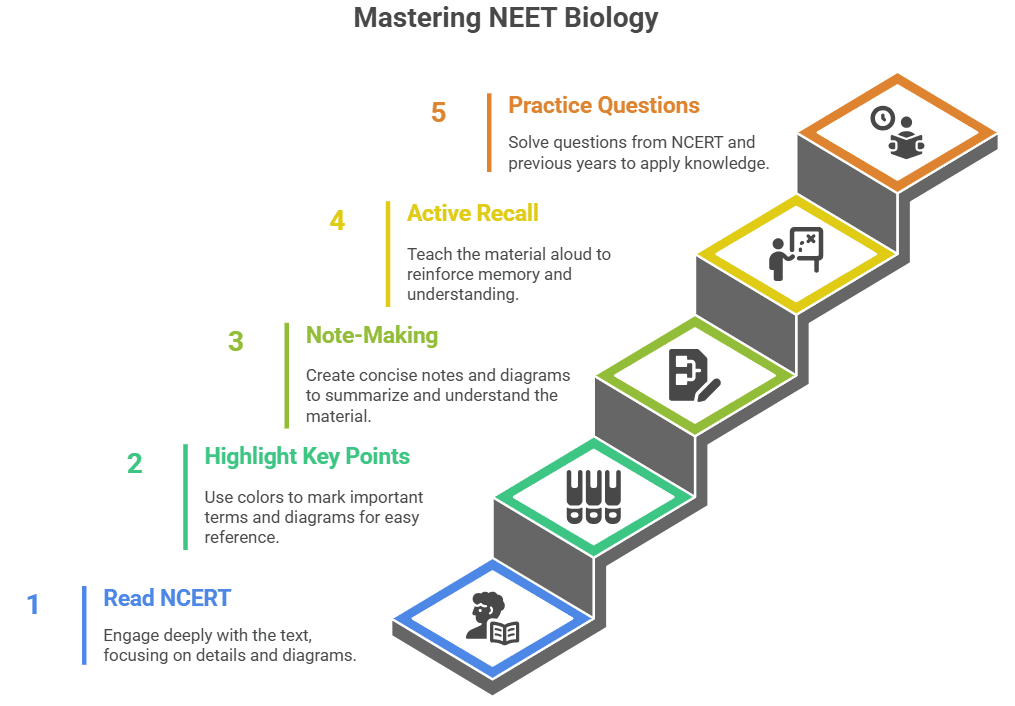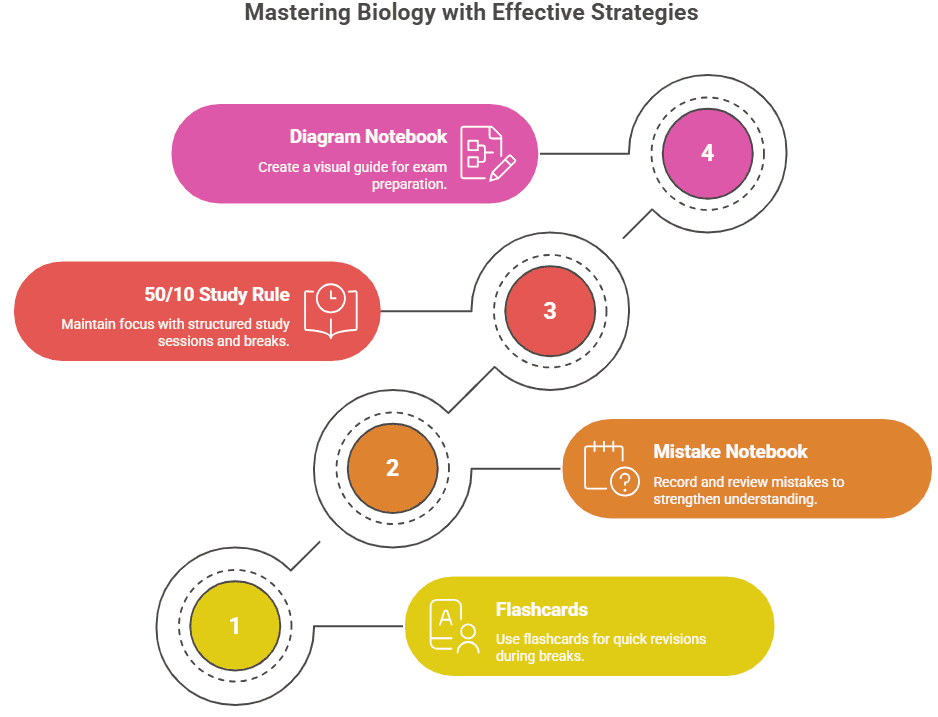If you’re in Class 11 and dreaming of cracking NEET, here’s a truth you can’t ignore: Biology decides your rank. With 50% weightage in NEET, Biology is the make-or-break subject. And where does it all start? Right here, in your Class 11 NCERT.
The challenge? You already spend 8 hours daily in school, which leaves you with limited time for self-study. That’s why you don’t need a “study harder” plan—you need a study smarter strategy. In this blog, we’ll build a realistic timetable that fits your school schedule and a ground-level NCERT strategy that helps you master Biology step by step.
Why a Biology-Focused Strategy?
- Biology carries 90 out of 180 questions in NEET.
- Most of these questions are directly based on the NCERT lines and diagrams.
- Strong Biology also helps you balance Physics and Chemistry by reducing exam stress.
So, while you can’t ignore other subjects, giving Biology the lion’s share of your study time is the smartest move in Class 11.
A Detailed 5-Step NCERT Biology Strategy
When it comes to NEET, it’s not just a simple and ordinary book; it’s your bible for Biology. But the trick isn’t finishing chapters; it’s how you process them. Here’s a step-by-step system:
- Read (3–4 pages slowly from NCERT)
- Don’t skim. Read line by line as if every word could appear in the exam (because it often does).
- Pay attention to bold terms, italicized words, and side notes.
- Whenever you see a diagram, spend 2–3 extra minutes on it: check labels, directions of arrows, and captions. NEET loves picking small details from these.
- Highlight (keywords, diagrams, tricky definitions)
- Use two colors: one for important terms/definitions, another for examples and exceptions.
- Circle values, years, or scientists’ names. They often form direct questions.
- Mark diagrams by underlining labels or redrawing them on the side. NEET has repeatedly lifted diagrams as it is.
- Note-Making (one-liners, flowcharts, diagram notes)
- Don’t rewrite NCERT. Instead, extract essence.
- Convert long paragraphs into flowcharts. Example: Photosynthesis → Light reaction → Products → Dark reaction.
- Make a separate diagram notebook where you redraw every diagram neatly. Each diagram = 1 page with labels. Over time, this becomes your revision booklet.
- Add “tricky facts” in the margins: e.g., “Xylem transports water only upwards.”
- Active Recall (teach yourself aloud)
- Close the book after reading a section. Now, explain it as if you’re teaching a friend.
- If you forget, reopen, reread, and try again. This process burns facts into long-term memory.
- Bonus tip: Use a whiteboard to draw structures while recalling. Writing + speaking reinforces memory.
- Practice Questions (end-of-chapter, exemplar, PYQs)
- Solve NCERT end-of-chapter questions, both MCQs and descriptive.
- Use NCERT Exemplar for higher-level practice; NEET directly borrows patterns from it.
- Every week, solve 20–30 previous year NEET Biology questions from the same topic. This shows you how NCERT lines transform into actual exam questions.
- Keep a “wrong answer log” → review it weekly.

If you repeat this Read → Highlight → Note → Recall → Practice cycle every day, NCERT itself becomes your study material + test prep book.
Daily Timetable (With 8 Hours of School)
Here’s a practical routine designed for Class 11 students who attend school from 8 AM – 2 PM:
| Time | Task | Notes / Focus Area |
| 6:00 – 6:30 AM | Quick Biology revision | Revise diagrams/keywords from yesterday |
| 6:30 – 7:15 AM | Physics numericals / concept practice | Solve NCERT problems or clarify concepts |
| 7:15 – 7:30 AM | Breakfast & prep | Fuel up for school |
| 8:00 – 2:00 PM | School | Focus on Biology lectures; note overlaps with NEET |
| 2:00 – 3:00 PM | Lunch + rest | Short nap allowed |
| 3:00 – 3:45 PM | Chemistry NCERT reading/problem practice | Organic/Inorganic theory or Physical numericals |
| 3:45 – 4:45 PM | Biology NCERT deep study | Notes + diagrams + flowcharts |
| 4:45 – 5:45 PM | Physics practice | NCERT + numerical practice |
| 5:45 – 6:15 PM | Break / snack | Relax, no screens |
| 6:15 – 7:15 PM | Biology NCERT questions + exemplar practice | End-chapter Qs, tricky definitions, diagrams |
| 7:15 – 8:00 PM | Chemistry problem-solving / revision | Rotate topics daily |
| 8:00 – 8:30 PM | Dinner | Keep light |
| 8:30 – 9:30 PM | Biology active recall | Break/snack |
| 9:30 – 10:00 PM | Mixed review | Flashcards, mistake notebook, Physics/Chem weak areas |
How much time should be given to Biology daily?
Allocate at least 2–3 hours daily to focused NCERT reading, notes, diagrams, and practice, aiming for 18–20 hours per week, which matches NEET’s Biology weightage.
Is NCERT enough for NEET Biology?
Yes, for Biology, NEET questions are predominantly NCERT-based. Read line by line, master diagrams, and supplement with NCERT Exemplar and previous year questions for top performance.
How can I avoid backlogs?
Stick to the weekly chapter plan—never let two weeks pass without covering scheduled topics. Revise weekly and aim to always be a step ahead of school or coaching lectures to avoid last-minute piling.
Is coaching mandatory to crack NEET?
No, selection happens from both self-study and coaching. The essential thing is discipline, consistency, and following a structured plan.
Should I do extra books besides NCERT for Biology?
For most, NCERT + Exemplar + PYQs are sufficient. Additional reference books may help if time permits, but only after fully mastering NCERT material.
A Guide to Weekly Study Distribution
Balancing subjects is crucial. Biology is the star, but Physics & Chemistry can’t be neglected. Here’s a realistic breakdown:
- Biology (18–20 hrs/week, ~60%)
- Daily: 2–3 hrs focused on NCERT reading, notes, diagrams, and practice.
- Saturday: 3–4 hrs Biology-only session (deeper practice + recall).
- Sunday: Mock test + weekly revision.
- Chemistry (5–6 hrs/week)
- Split into Physical (numerical practice) and Organic/Inorganic (NCERT reading).
- Even one hour daily is enough at this stage.
- Physics (5–6 hrs/week)
- Practice basic numericals daily (at least 5–10 problems).
- Reserve weekends for conceptual clarity (since Physics takes longer).
This ratio mirrors NEET’s weightage: Biology = 50%, Chemistry = 25%, Physics = 25%. By Class 12, this distribution will save you from Biology overload.
Weekend & Sunday Plan
Since weekdays are tight, weekends are where you strengthen your base:
- Morning (6:30 – 8:30 AM): NCERT Biology (2 topics deeply).
- Late Morning (9:00 – 11:00 AM): Solve NEET PYQs (previous years).
- Afternoon (2:00 – 4:00 PM): Mock test (Biology only) + review mistakes.
- Evening (6:30 – 8:30 PM): Revise all the Biology covered that week.
This ensures you revise + test yourself regularly, not just keep reading.
A Detailed Revision Strategy
Revision is the bridge between studying and remembering. Without it, even 6 months of effort can vanish in 2 weeks. Here’s a foolproof cycle:
- Daily Revision:
- Morning (15 mins): Revise yesterday’s Biology pages.
- Night (20–30 mins): Quickly recall diagrams and flowcharts before bed.
- Benefit: Keeps yesterday’s learning alive today.
- Weekly Revision (Sunday evening):
- Dedicate 2 hours to revising all the Biology studied that week.
Don’t reread full chapters. Instead, go through your notes, flashcards, and diagram notebook. - Take a 30-minute mini quiz (self-made or from a test series).
- Dedicate 2 hours to revising all the Biology studied that week.
- Monthly Revision:
- Pick one Sunday every month.
- Do a rapid-fire NCERT run: Flip through pages, read underlined lines, recall diagrams.
- Spend 3–4 hours on Biology + 1 hr each on Physics & Chemistry.
This layered revision ensures no topic ever gets “blurred” in your memory.
Smart Study Tools
- Flashcards:
- Use physical index cards or apps like Anki.
- Revise them in short bursts during travel, before sleep, or during school breaks.
- Mistake Notebook:
- Every wrong MCQ = Write the question + correct explanation.
- Revise this notebook weekly. Over time, your “mistakes” become your strongest points.
- 50/10 Study rule:
- Study 50 minutes → take a 10-minute break.
- Helps you sustain focus for long Biology reading sessions.
- In breaks, stretch or hydrate; don’t use Instagram/YouTube.
- Diagram Notebook:
- Redraw every NCERT diagram neatly in one dedicated notebook.
- Add labels, color coding, and short notes beside each diagram.
- Before exams, this notebook becomes a visual memory booster.

Closing Thoughts
Class 11 is where your NEET journey truly begins, and Biology is your anchor subject. With school taking 8 hours a day, you don’t need to overload yourself; you need to study smarter.
By sticking to this approach, you’ll not only finish Class 11 Biology but master it deeply. This foundation will make Class 12 smoother, your NEET prep stronger, and your confidence sky-high.
Every disciplined hour today is an investment in your dream medical seat tomorrow. So start now, and stay consistent








